ENG101 Essay: Plastic Bag Ban Controversy and Arguments
VerifiedAdded on 2023/04/21
|5
|1366
|338
Essay
AI Summary
This essay examines the controversial issue of banning plastic bags in retail shops and online stores. The author argues for the ban of plastic bags in retail shops, citing the environmental damage caused by plastic waste, the high rates of plastic bag usage in New Zealand, and the availability of reusable alternatives. The essay presents arguments in favor of banning plastic bags, and the government initiatives taken to reduce plastic bag usage, as well as the potential benefits such as reduced pollution and increased awareness. The author opposes taxing online shoppers for plastic bags, advocating for a complete ban and encouraging online retailers to promote eco-friendly practices. The essay concludes by emphasizing the environmental benefits of a plastic bag ban and the need for stricter government action. It also cites several academic sources to support the arguments. The author believes that banning plastic bags presents several benefits to the environment and that government strict actions will prove to be effective for such improvement.
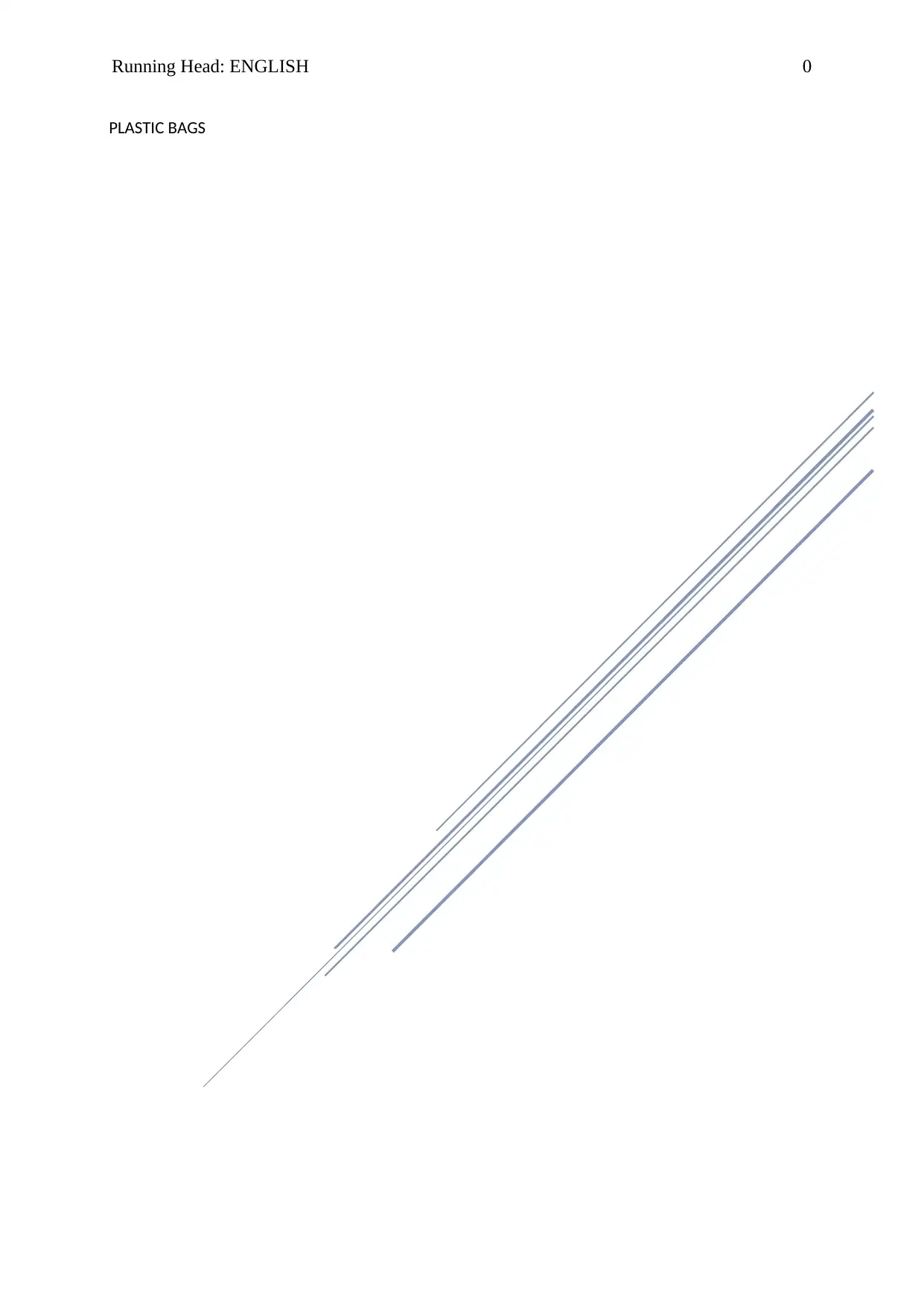
Running Head: ENGLISH 0
PLASTIC BAGS
PLASTIC BAGS
Paraphrase This Document
Need a fresh take? Get an instant paraphrase of this document with our AI Paraphraser
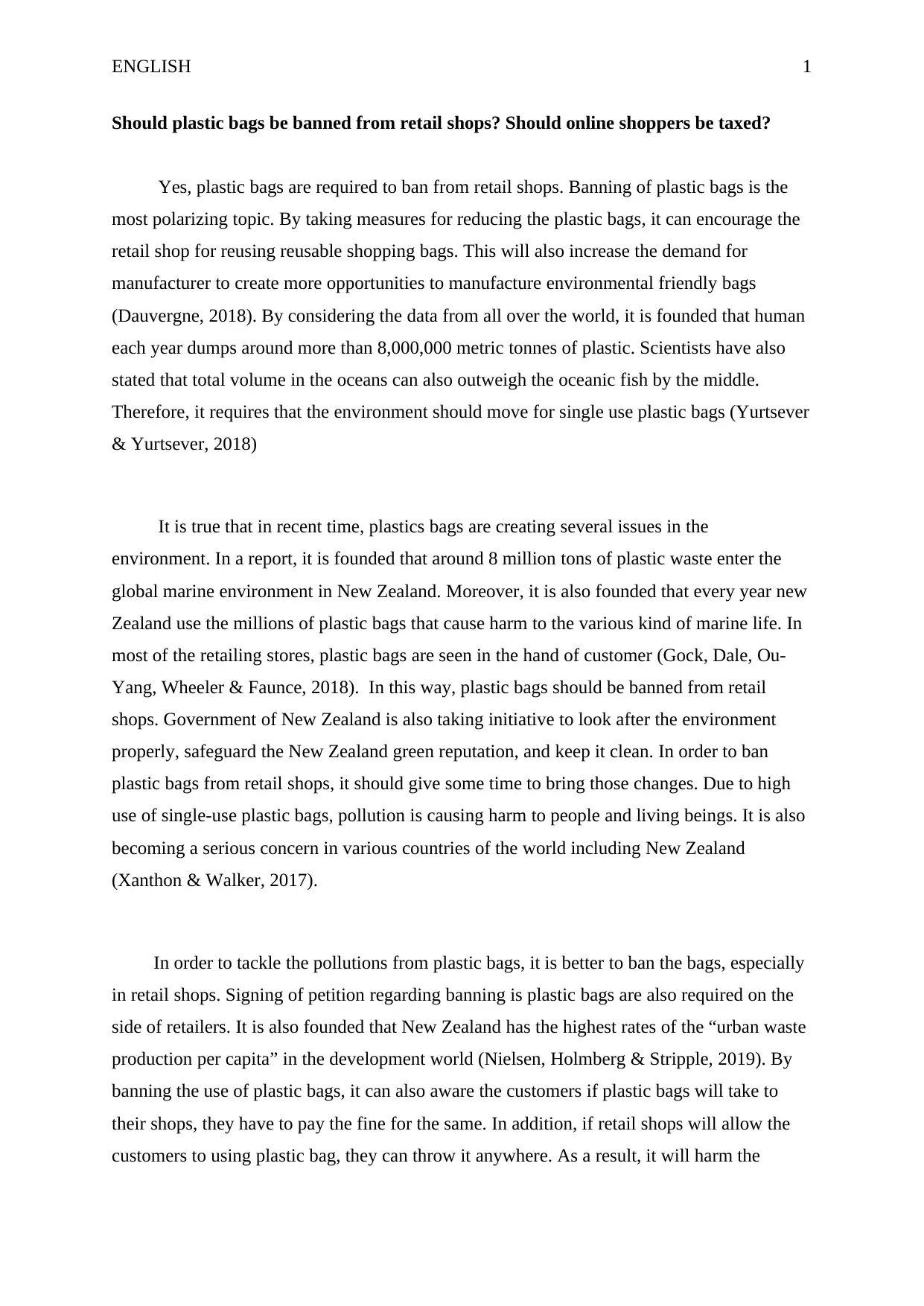
ENGLISH 1
Should plastic bags be banned from retail shops? Should online shoppers be taxed?
Yes, plastic bags are required to ban from retail shops. Banning of plastic bags is the
most polarizing topic. By taking measures for reducing the plastic bags, it can encourage the
retail shop for reusing reusable shopping bags. This will also increase the demand for
manufacturer to create more opportunities to manufacture environmental friendly bags
(Dauvergne, 2018). By considering the data from all over the world, it is founded that human
each year dumps around more than 8,000,000 metric tonnes of plastic. Scientists have also
stated that total volume in the oceans can also outweigh the oceanic fish by the middle.
Therefore, it requires that the environment should move for single use plastic bags (Yurtsever
& Yurtsever, 2018)
It is true that in recent time, plastics bags are creating several issues in the
environment. In a report, it is founded that around 8 million tons of plastic waste enter the
global marine environment in New Zealand. Moreover, it is also founded that every year new
Zealand use the millions of plastic bags that cause harm to the various kind of marine life. In
most of the retailing stores, plastic bags are seen in the hand of customer (Gock, Dale, Ou-
Yang, Wheeler & Faunce, 2018). In this way, plastic bags should be banned from retail
shops. Government of New Zealand is also taking initiative to look after the environment
properly, safeguard the New Zealand green reputation, and keep it clean. In order to ban
plastic bags from retail shops, it should give some time to bring those changes. Due to high
use of single-use plastic bags, pollution is causing harm to people and living beings. It is also
becoming a serious concern in various countries of the world including New Zealand
(Xanthon & Walker, 2017).
In order to tackle the pollutions from plastic bags, it is better to ban the bags, especially
in retail shops. Signing of petition regarding banning is plastic bags are also required on the
side of retailers. It is also founded that New Zealand has the highest rates of the “urban waste
production per capita” in the development world (Nielsen, Holmberg & Stripple, 2019). By
banning the use of plastic bags, it can also aware the customers if plastic bags will take to
their shops, they have to pay the fine for the same. In addition, if retail shops will allow the
customers to using plastic bag, they can throw it anywhere. As a result, it will harm the
Should plastic bags be banned from retail shops? Should online shoppers be taxed?
Yes, plastic bags are required to ban from retail shops. Banning of plastic bags is the
most polarizing topic. By taking measures for reducing the plastic bags, it can encourage the
retail shop for reusing reusable shopping bags. This will also increase the demand for
manufacturer to create more opportunities to manufacture environmental friendly bags
(Dauvergne, 2018). By considering the data from all over the world, it is founded that human
each year dumps around more than 8,000,000 metric tonnes of plastic. Scientists have also
stated that total volume in the oceans can also outweigh the oceanic fish by the middle.
Therefore, it requires that the environment should move for single use plastic bags (Yurtsever
& Yurtsever, 2018)
It is true that in recent time, plastics bags are creating several issues in the
environment. In a report, it is founded that around 8 million tons of plastic waste enter the
global marine environment in New Zealand. Moreover, it is also founded that every year new
Zealand use the millions of plastic bags that cause harm to the various kind of marine life. In
most of the retailing stores, plastic bags are seen in the hand of customer (Gock, Dale, Ou-
Yang, Wheeler & Faunce, 2018). In this way, plastic bags should be banned from retail
shops. Government of New Zealand is also taking initiative to look after the environment
properly, safeguard the New Zealand green reputation, and keep it clean. In order to ban
plastic bags from retail shops, it should give some time to bring those changes. Due to high
use of single-use plastic bags, pollution is causing harm to people and living beings. It is also
becoming a serious concern in various countries of the world including New Zealand
(Xanthon & Walker, 2017).
In order to tackle the pollutions from plastic bags, it is better to ban the bags, especially
in retail shops. Signing of petition regarding banning is plastic bags are also required on the
side of retailers. It is also founded that New Zealand has the highest rates of the “urban waste
production per capita” in the development world (Nielsen, Holmberg & Stripple, 2019). By
banning the use of plastic bags, it can also aware the customers if plastic bags will take to
their shops, they have to pay the fine for the same. In addition, if retail shops will allow the
customers to using plastic bag, they can throw it anywhere. As a result, it will harm the
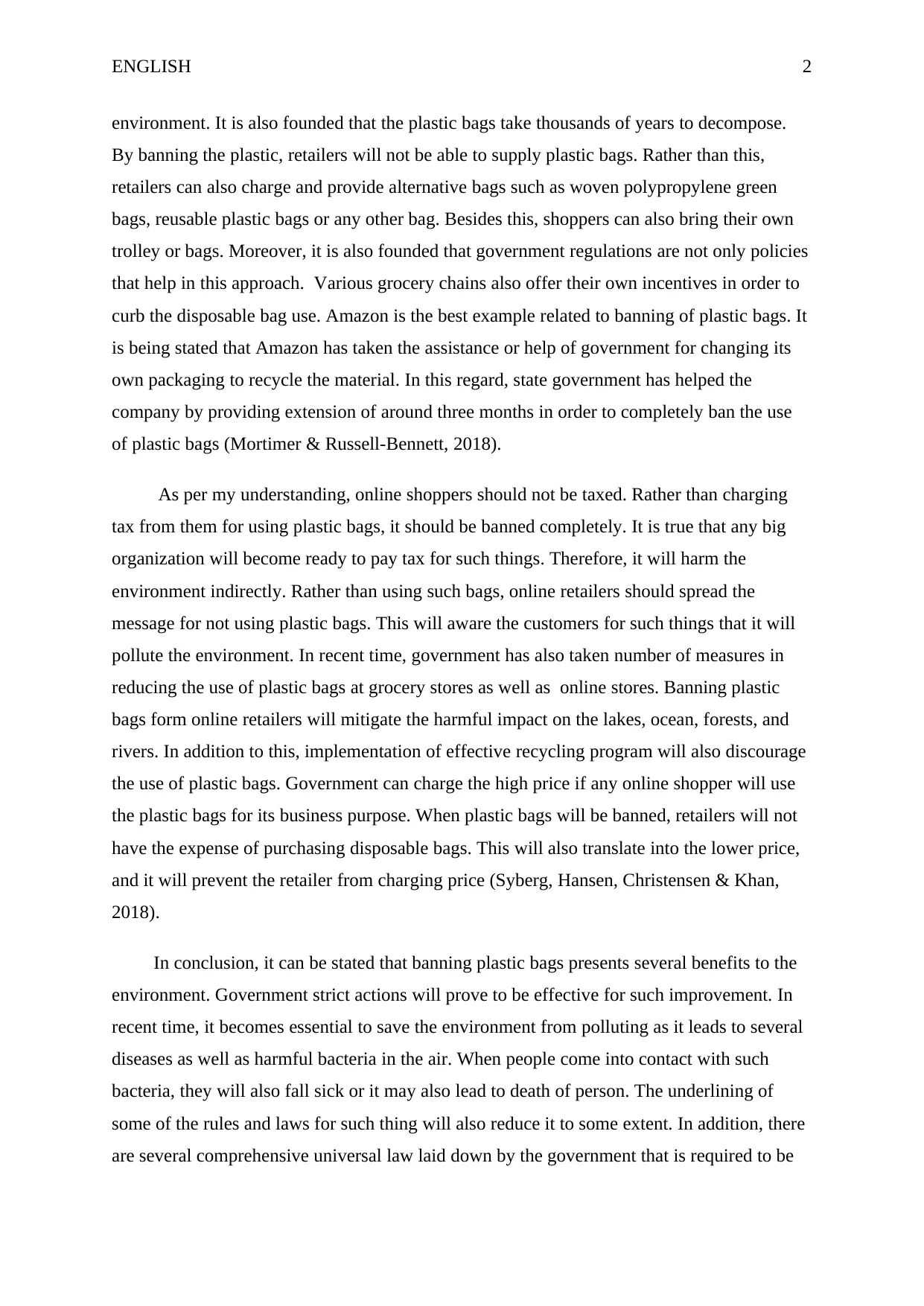
ENGLISH 2
environment. It is also founded that the plastic bags take thousands of years to decompose.
By banning the plastic, retailers will not be able to supply plastic bags. Rather than this,
retailers can also charge and provide alternative bags such as woven polypropylene green
bags, reusable plastic bags or any other bag. Besides this, shoppers can also bring their own
trolley or bags. Moreover, it is also founded that government regulations are not only policies
that help in this approach. Various grocery chains also offer their own incentives in order to
curb the disposable bag use. Amazon is the best example related to banning of plastic bags. It
is being stated that Amazon has taken the assistance or help of government for changing its
own packaging to recycle the material. In this regard, state government has helped the
company by providing extension of around three months in order to completely ban the use
of plastic bags (Mortimer & Russell-Bennett, 2018).
As per my understanding, online shoppers should not be taxed. Rather than charging
tax from them for using plastic bags, it should be banned completely. It is true that any big
organization will become ready to pay tax for such things. Therefore, it will harm the
environment indirectly. Rather than using such bags, online retailers should spread the
message for not using plastic bags. This will aware the customers for such things that it will
pollute the environment. In recent time, government has also taken number of measures in
reducing the use of plastic bags at grocery stores as well as online stores. Banning plastic
bags form online retailers will mitigate the harmful impact on the lakes, ocean, forests, and
rivers. In addition to this, implementation of effective recycling program will also discourage
the use of plastic bags. Government can charge the high price if any online shopper will use
the plastic bags for its business purpose. When plastic bags will be banned, retailers will not
have the expense of purchasing disposable bags. This will also translate into the lower price,
and it will prevent the retailer from charging price (Syberg, Hansen, Christensen & Khan,
2018).
In conclusion, it can be stated that banning plastic bags presents several benefits to the
environment. Government strict actions will prove to be effective for such improvement. In
recent time, it becomes essential to save the environment from polluting as it leads to several
diseases as well as harmful bacteria in the air. When people come into contact with such
bacteria, they will also fall sick or it may also lead to death of person. The underlining of
some of the rules and laws for such thing will also reduce it to some extent. In addition, there
are several comprehensive universal law laid down by the government that is required to be
environment. It is also founded that the plastic bags take thousands of years to decompose.
By banning the plastic, retailers will not be able to supply plastic bags. Rather than this,
retailers can also charge and provide alternative bags such as woven polypropylene green
bags, reusable plastic bags or any other bag. Besides this, shoppers can also bring their own
trolley or bags. Moreover, it is also founded that government regulations are not only policies
that help in this approach. Various grocery chains also offer their own incentives in order to
curb the disposable bag use. Amazon is the best example related to banning of plastic bags. It
is being stated that Amazon has taken the assistance or help of government for changing its
own packaging to recycle the material. In this regard, state government has helped the
company by providing extension of around three months in order to completely ban the use
of plastic bags (Mortimer & Russell-Bennett, 2018).
As per my understanding, online shoppers should not be taxed. Rather than charging
tax from them for using plastic bags, it should be banned completely. It is true that any big
organization will become ready to pay tax for such things. Therefore, it will harm the
environment indirectly. Rather than using such bags, online retailers should spread the
message for not using plastic bags. This will aware the customers for such things that it will
pollute the environment. In recent time, government has also taken number of measures in
reducing the use of plastic bags at grocery stores as well as online stores. Banning plastic
bags form online retailers will mitigate the harmful impact on the lakes, ocean, forests, and
rivers. In addition to this, implementation of effective recycling program will also discourage
the use of plastic bags. Government can charge the high price if any online shopper will use
the plastic bags for its business purpose. When plastic bags will be banned, retailers will not
have the expense of purchasing disposable bags. This will also translate into the lower price,
and it will prevent the retailer from charging price (Syberg, Hansen, Christensen & Khan,
2018).
In conclusion, it can be stated that banning plastic bags presents several benefits to the
environment. Government strict actions will prove to be effective for such improvement. In
recent time, it becomes essential to save the environment from polluting as it leads to several
diseases as well as harmful bacteria in the air. When people come into contact with such
bacteria, they will also fall sick or it may also lead to death of person. The underlining of
some of the rules and laws for such thing will also reduce it to some extent. In addition, there
are several comprehensive universal law laid down by the government that is required to be
⊘ This is a preview!⊘
Do you want full access?
Subscribe today to unlock all pages.

Trusted by 1+ million students worldwide
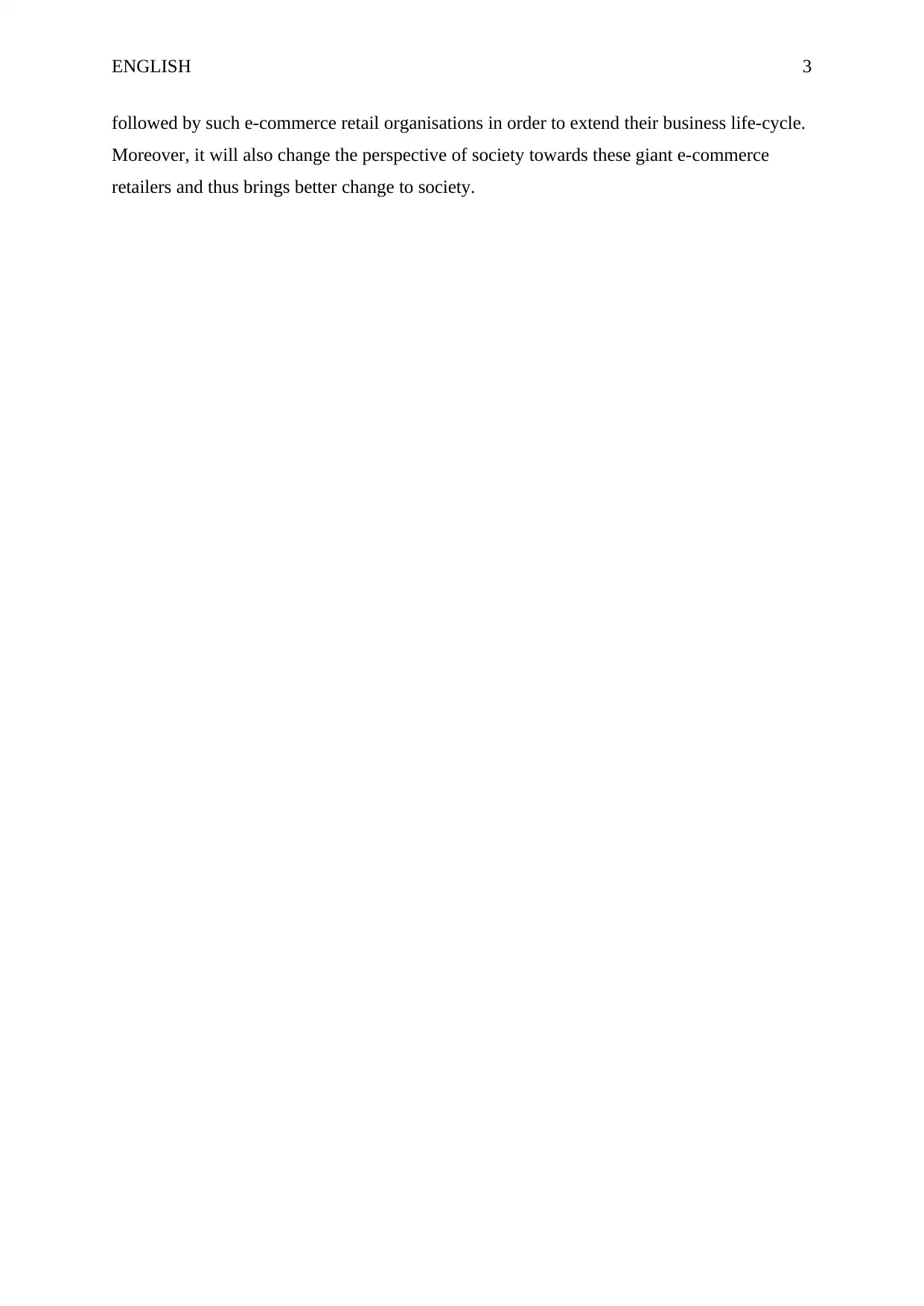
ENGLISH 3
followed by such e-commerce retail organisations in order to extend their business life-cycle.
Moreover, it will also change the perspective of society towards these giant e-commerce
retailers and thus brings better change to society.
followed by such e-commerce retail organisations in order to extend their business life-cycle.
Moreover, it will also change the perspective of society towards these giant e-commerce
retailers and thus brings better change to society.
Paraphrase This Document
Need a fresh take? Get an instant paraphrase of this document with our AI Paraphraser
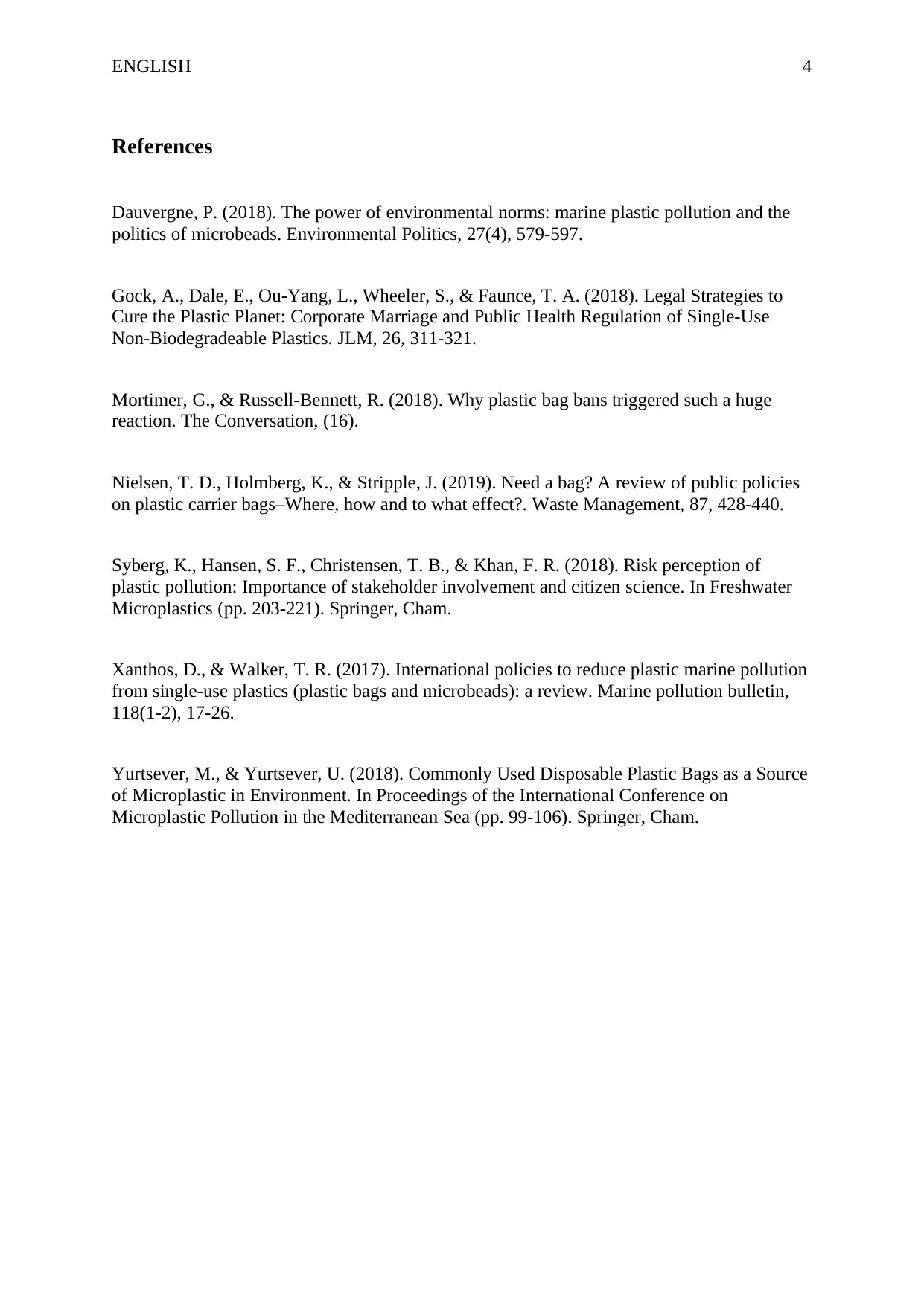
ENGLISH 4
References
Dauvergne, P. (2018). The power of environmental norms: marine plastic pollution and the
politics of microbeads. Environmental Politics, 27(4), 579-597.
Gock, A., Dale, E., Ou-Yang, L., Wheeler, S., & Faunce, T. A. (2018). Legal Strategies to
Cure the Plastic Planet: Corporate Marriage and Public Health Regulation of Single-Use
Non-Biodegradeable Plastics. JLM, 26, 311-321.
Mortimer, G., & Russell-Bennett, R. (2018). Why plastic bag bans triggered such a huge
reaction. The Conversation, (16).
Nielsen, T. D., Holmberg, K., & Stripple, J. (2019). Need a bag? A review of public policies
on plastic carrier bags–Where, how and to what effect?. Waste Management, 87, 428-440.
Syberg, K., Hansen, S. F., Christensen, T. B., & Khan, F. R. (2018). Risk perception of
plastic pollution: Importance of stakeholder involvement and citizen science. In Freshwater
Microplastics (pp. 203-221). Springer, Cham.
Xanthos, D., & Walker, T. R. (2017). International policies to reduce plastic marine pollution
from single-use plastics (plastic bags and microbeads): a review. Marine pollution bulletin,
118(1-2), 17-26.
Yurtsever, M., & Yurtsever, U. (2018). Commonly Used Disposable Plastic Bags as a Source
of Microplastic in Environment. In Proceedings of the International Conference on
Microplastic Pollution in the Mediterranean Sea (pp. 99-106). Springer, Cham.
References
Dauvergne, P. (2018). The power of environmental norms: marine plastic pollution and the
politics of microbeads. Environmental Politics, 27(4), 579-597.
Gock, A., Dale, E., Ou-Yang, L., Wheeler, S., & Faunce, T. A. (2018). Legal Strategies to
Cure the Plastic Planet: Corporate Marriage and Public Health Regulation of Single-Use
Non-Biodegradeable Plastics. JLM, 26, 311-321.
Mortimer, G., & Russell-Bennett, R. (2018). Why plastic bag bans triggered such a huge
reaction. The Conversation, (16).
Nielsen, T. D., Holmberg, K., & Stripple, J. (2019). Need a bag? A review of public policies
on plastic carrier bags–Where, how and to what effect?. Waste Management, 87, 428-440.
Syberg, K., Hansen, S. F., Christensen, T. B., & Khan, F. R. (2018). Risk perception of
plastic pollution: Importance of stakeholder involvement and citizen science. In Freshwater
Microplastics (pp. 203-221). Springer, Cham.
Xanthos, D., & Walker, T. R. (2017). International policies to reduce plastic marine pollution
from single-use plastics (plastic bags and microbeads): a review. Marine pollution bulletin,
118(1-2), 17-26.
Yurtsever, M., & Yurtsever, U. (2018). Commonly Used Disposable Plastic Bags as a Source
of Microplastic in Environment. In Proceedings of the International Conference on
Microplastic Pollution in the Mediterranean Sea (pp. 99-106). Springer, Cham.
1 out of 5
Related Documents
Your All-in-One AI-Powered Toolkit for Academic Success.
+13062052269
info@desklib.com
Available 24*7 on WhatsApp / Email
![[object Object]](/_next/static/media/star-bottom.7253800d.svg)
Unlock your academic potential
Copyright © 2020–2026 A2Z Services. All Rights Reserved. Developed and managed by ZUCOL.





